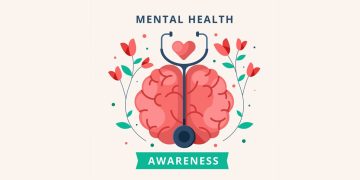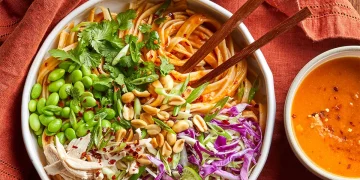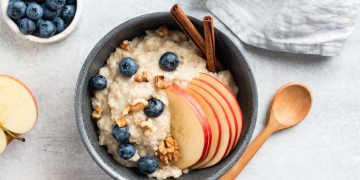Fuel Your Fitness Journey: The Ultimate Guide to Healthy Eating for Optimal Performance
Embarking on a fitness journey is an exciting and rewarding endeavor. Whether you are a seasoned athlete or a beginner looking to improve your overall health, proper nutrition plays a crucial role in achieving your fitness goals. In this comprehensive guide, we will explore the importance of healthy eating for optimal performance and provide practical tips to fuel your body for success.
Why Healthy Eating Matters
When it comes to fitness and performance, what you eat can make a significant difference in how you feel and perform. Proper nutrition not only fuels your workouts but also supports muscle recovery, boosts energy levels, and enhances overall well-being. Consuming a well-balanced diet rich in nutrients is essential for optimal performance and achieving your fitness goals.
The Benefits of Healthy Eating for Fitness
There are numerous benefits to incorporating healthy eating habits into your fitness routine. Some of the key advantages include:
- Improved energy levels: Eating nutrient-dense foods can provide sustained energy throughout the day and during workouts.
- Enhanced performance: Fueling your body with the right nutrients can improve strength, endurance, and recovery.
- Weight management: A balanced diet can help you maintain a healthy weight and support fat loss goals.
- Reduced risk of chronic disease: Eating a variety of fruits, vegetables, whole grains, and lean proteins can lower your risk of developing chronic diseases.
What to Eat for Optimal Performance
Now that we understand the importance of healthy eating for fitness, let’s delve into what you should be eating to fuel your body for optimal performance.
Protein
Protein is essential for muscle repair and growth, making it a crucial nutrient for athletes and fitness enthusiasts. Include sources of lean protein such as chicken, turkey, fish, eggs, or plant-based options like tofu and legumes in your meals to support muscle recovery and development.
Carbohydrates
Carbohydrates are the body’s primary source of energy, especially during high-intensity workouts. Opt for complex carbohydrates like whole grains, fruits, and vegetables to sustain energy levels and improve performance. Avoid refined carbohydrates like white bread and sugary snacks, as they can cause energy crashes and hinder your progress.
Fats
Fats are also important for overall health and performance. Include sources of healthy fats such as avocados, nuts, seeds, and olive oil in your diet to support brain function, hormone production, and energy levels. Avoid trans fats and saturated fats found in processed foods and fried items, as they can have negative effects on your health.
Hydration
Staying hydrated is essential for optimal performance and recovery. Drink plenty of water throughout the day, especially before, during, and after workouts. Electrolyte-rich beverages like coconut water or sports drinks can also help replenish lost fluids and minerals during intense exercise sessions.
Meal Planning Tips for Success
Planning your meals in advance can help you stay on track with your fitness goals and ensure you are getting the nutrients your body needs. Here are some tips for successful meal planning:
1. Create a Balanced Plate
When preparing your meals, aim to include a variety of nutrients from different food groups. Fill half your plate with fruits and vegetables, a quarter with lean protein, and a quarter with whole grains or starchy vegetables for a well-rounded meal.
2. Batch Cook and Prep Ahead
Spend a few hours each week batch cooking and preparing meals ahead of time. This can save you time during busy weekdays and prevent you from making unhealthy food choices when you are pressed for time.
3. Snack Smart
Choose nutrient-dense snacks like Greek yogurt, nuts, fruits, or whole grain crackers to keep you fueled between meals. Avoid processed snacks high in sugar and unhealthy fats, as they can sabotage your fitness goals.
4. Listen to Your Body
Pay attention to your hunger cues and eat when you are hungry. Avoid restrictive diets or skipping meals, as they can lead to low energy levels and hinder your performance. Fuel your body with the nutrients it needs to thrive.
Common Questions About Healthy Eating for Fitness
As you embark on your fitness journey, you may have some questions about healthy eating and nutrition. Here are some common queries addressed:
1. Can I Still Enjoy Treats While Eating Healthy?
Absolutely! Incorporating treats in moderation is a sustainable approach to healthy eating. Allow yourself to indulge in your favorite treats occasionally, but focus on nourishing your body with nutrient-dense foods most of the time.
2. What are Some Healthy Post-Workout Snacks?
After a workout, it’s important to refuel your body with a combination of protein and carbohydrates. Opt for options like a protein smoothie, a turkey and avocado wrap, or Greek yogurt with berries to support muscle recovery and replenish glycogen stores.
3. How Can I Stay Motivated to Eat Healthy?
Staying motivated to eat healthy can be challenging at times. Set realistic goals, celebrate your progress, and focus on how good you feel when nourishing your body with nutritious foods. Surround yourself with like-minded individuals who support your healthy lifestyle choices.
Conclusion
Healthy eating is a cornerstone of a successful fitness journey. By fueling your body with nutrient-dense foods, you can enhance your performance, boost energy levels, and achieve your fitness goals. Remember to focus on whole, unprocessed foods, stay hydrated, and listen to your body’s needs. With the right nutrition and mindset, you can fuel your fitness journey for optimal success.
Start incorporating these tips into your daily routine and watch how your fitness and overall health improve. Here’s to a healthier, fitter you!












































